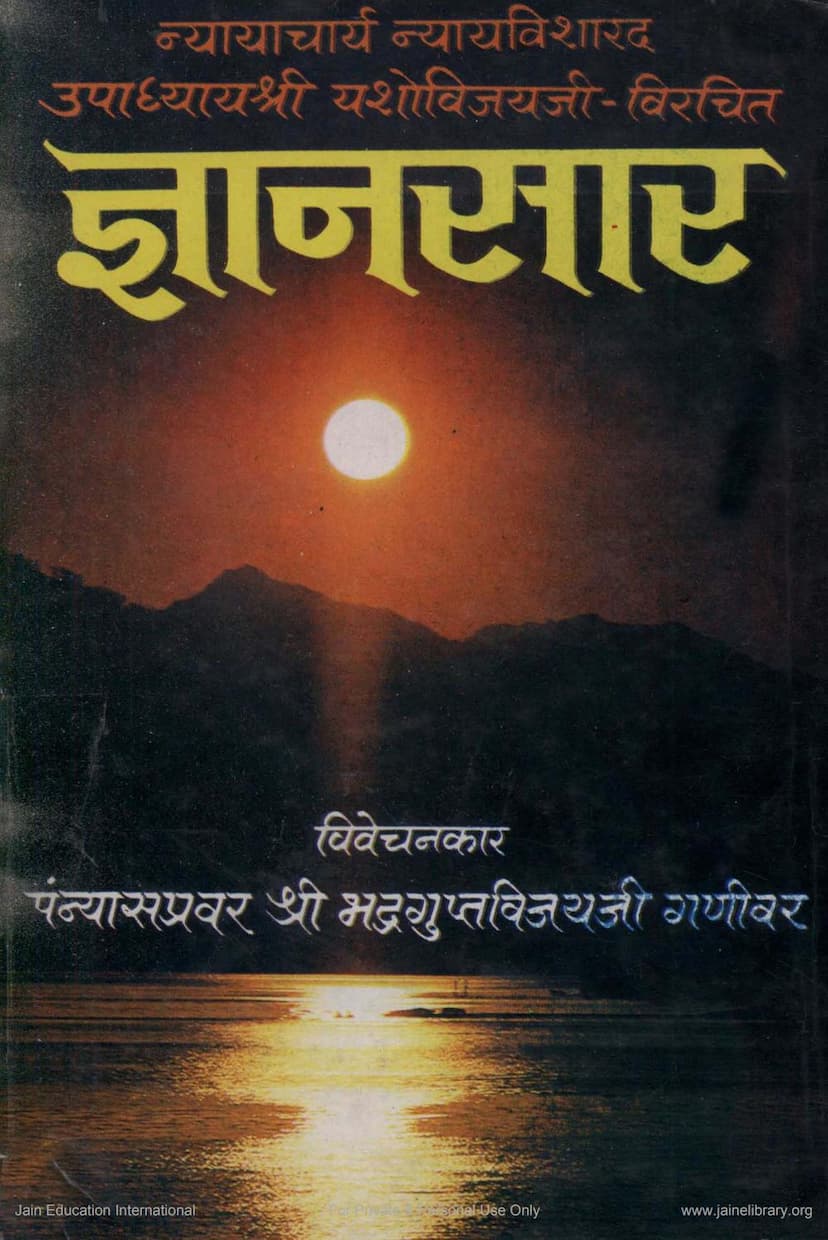Gyansara
Added to library: September 1, 2025

Summary
Based on the provided Jain text, here is a comprehensive summary in English:
Book Title: Gyansara (ज्ञानसार) Author: Yashovijay Upadhyay (यशोविजय उपाध्याय) Commentator/Elucidator: Nyayavisharad Pt. Panyasvar P. Shri Bhadragupta Vijay Ganivar (न्यायाचार्य न्यायविशारद उपाध्यायश्री यशोविजयजी-विरचित ज्ञानसार विवेचनकार । पंन्यासप्रवर श्री भद्रगुप्तविजयजी गणीवर) Publisher: Vishvakalyan Prakashan Trust Mehsana (श्री विश्वकल्याण प्रकाशन ट्रस्ट कंबोईनगर के पास मेहसाना)
Overview:
"Gyansara" is a significant Jain text authored by the esteemed scholar and philosopher Acharya Yashovijayji, with elaborate commentary provided by Pt. Panyasvar Shri Bhadragupta Vijay Ganivar. Published by Vishvakalyan Prakashan Trust Mehsana, the book aims to guide individuals towards spiritual liberation and inner peace through profound philosophical and practical insights. The text is structured into 32 sections, each represented by an "ashtak" (a group of eight verses or points), covering essential aspects of the Jain spiritual path.
Author and Commentator:
- Yashovijay Upadhyay: Renowned for his exceptional intellect and profound scholarship, Yashovijay Upadhyay was a prominent Jain Acharya of the 17th century. He was honored with the title "Nyayavisharad" and "Mahopadhyaya." His life was dedicated to the study, teaching, and writing of spiritual literature. He authored numerous works in Sanskrit, Prakrit, Gujarati, and Rajasthani, encompassing various philosophical, literary, and spiritual topics. He was particularly known for his ability to present complex philosophical concepts in an accessible manner, bridging the gap between scholarly understanding and practical spiritual pursuit. His literary output is considered a significant contribution to Jain philosophy and is often compared to that of earlier great Acharyas like Haribhadrasuri.
- Bhadragupta Vijay Ganivar: The commentator of "Gyansara," he is lauded for his profound understanding and insightful elucidation of Yashovijayji's original work. His commentary, written with deep spiritual realization and clarity, makes the profound teachings of "Gyansara" accessible to a wider audience. His commentary aims to bring inner peace and spiritual progress to the readers.
Key Themes and Content:
The "Gyansara" is presented as a path to spiritual fulfillment, focusing on inner transformation rather than external rituals. The text emphasizes the importance of cultivating virtues and understanding the true nature of the soul and reality. The 32 "ashtaks" systematically cover a range of spiritual concepts and practices:
- Purnata (Perfection): The journey from incompleteness to the attainment of the soul's perfect and eternal nature.
- Magnata (Absorption/Immersion): Deep immersion in spiritual knowledge and contemplation.
- Sthirata (Steadfastness): Cultivating mental stability and unwavering focus on the spiritual path.
- Amoha (Non-attachment): Overcoming worldly attachments and illusions to achieve detachment.
- Gyan (Knowledge): The supreme importance of true, soul-liberating knowledge.
- Shama (Equanimity): Cultivating inner peace and equanimity amidst worldly fluctuations.
- Indriya-Jay (Conquest of Senses): Mastering the senses and preventing them from distracting the spiritual journey.
- Tyag (Renunciation): The practice of renunciation, both external and internal, as a path to liberation.
- Kriya (Action): The importance of performing actions with the right intention and understanding, aligned with spiritual principles.
- Trupti (Contentment): Achieving inner satisfaction and contentment through spiritual practice.
- Nislepta (Non-attachment/Detachment): Living in the world without being affected by its outcomes.
- Nihspruhata (Absence of Desire): Freedom from worldly desires and cravings.
- Mauna (Silence): The power of silence and introspection in spiritual growth.
- Vidya (True Knowledge): The distinction between worldly knowledge and the ultimate spiritual knowledge.
- Vivek (Discernment): The ability to distinguish between the eternal soul and the impermanent physical world.
- Madhyastha (Neutrality/Impartiality): Maintaining an unbiased perspective towards all situations and beings.
- Nirbhayata (Fearlessness): Overcoming fear and cultivating courage on the spiritual path.
- Anatmasaṁśa (Selfless Praise): Avoiding self-praise and focusing on inner qualities.
- Tattvadrishti (True Vision): Perceiving reality as it is, beyond superficial appearances.
- Sarvasamriddhi (All-round Prosperity): Attaining true prosperity through spiritual advancement.
- Karmavipaka-Chintan (Contemplation of Karma's Fruits): Understanding the consequences of actions and their impact on the soul.
- Bhavodvega (Disgust with Worldly Existence): Developing a sense of weariness with the cycle of birth and death.
- Lokasanjya-Tyag (Renunciation of Worldly Notions): Letting go of societal expectations and conventional wisdom that hinder spiritual progress.
- Shastra (Scriptures): The indispensable role of scriptures as guides on the spiritual path.
- Parigraha-Tyag (Renunciation of Possessions): Detachment from material and psychological possessions.
- Dhyan (Meditation): The practice of focused contemplation to achieve inner peace and self-realization.
- Niyag (Rituals/Practice): The importance of performing prescribed spiritual practices.
- Sadanushthan (Righteous Deeds): The necessity of righteous actions for spiritual progress.
- Bhavapuja (Internal Worship): The significance of devotion and worship rooted in inner feeling rather than external display.
- Tapas (Austerity): The role of self-discipline and asceticism in spiritual purification.
- Samadhi (Concentration/Trance): Achieving a state of profound mental stillness and absorption.
- Upasarpadānam (Patience/Endurance): The practice of patiently enduring hardships and challenges.
Purpose and Message:
"Gyansara" is designed to be a comprehensive guide for the sincere seeker on the path to Moksha (liberation). It emphasizes that true happiness and freedom come from within, through self-realization and detachment from worldly illusions. The text encourages readers to cultivate inner virtues, understand the true nature of the soul, and practice the principles of Jainism to achieve a life of peace, contentment, and ultimate spiritual liberation. The commentary by Bhadragupta Vijay Ganivar further illuminates these teachings, making them practical and relatable for the modern reader. The book aims to provide a holistic approach to spiritual development, encompassing philosophical understanding, ethical conduct, and meditative practices.